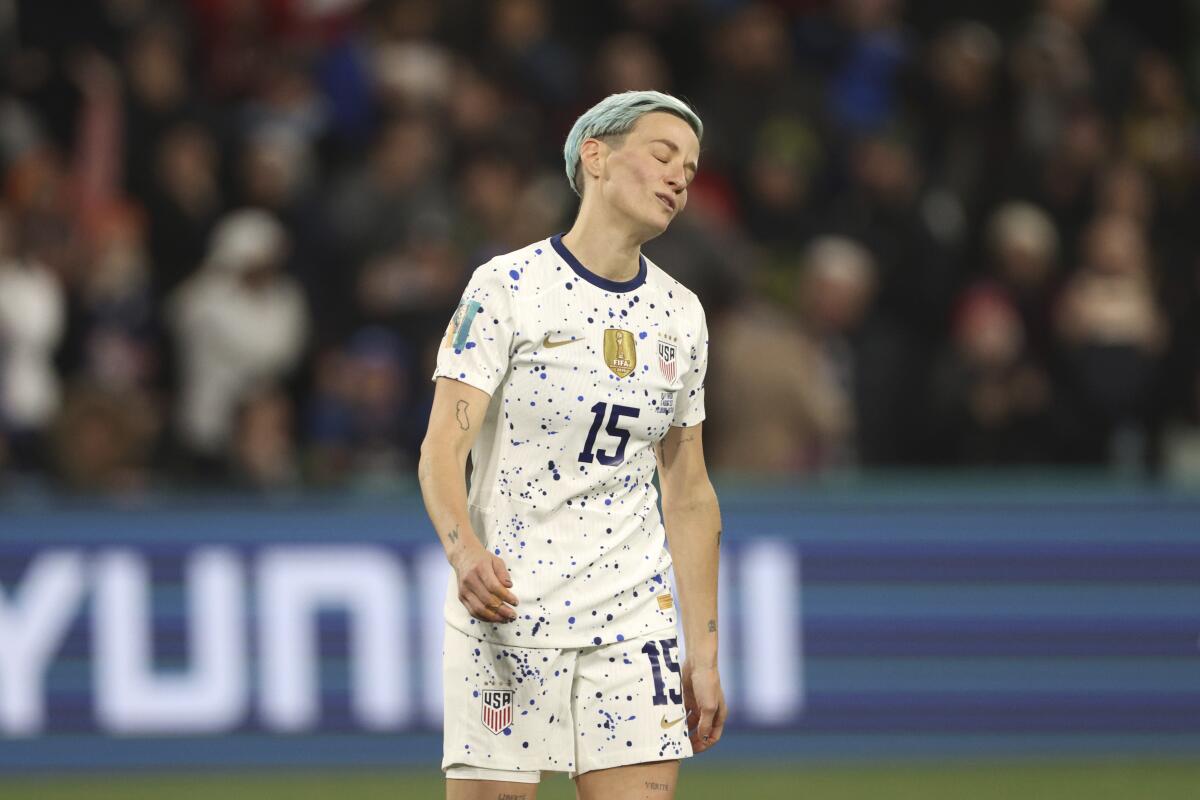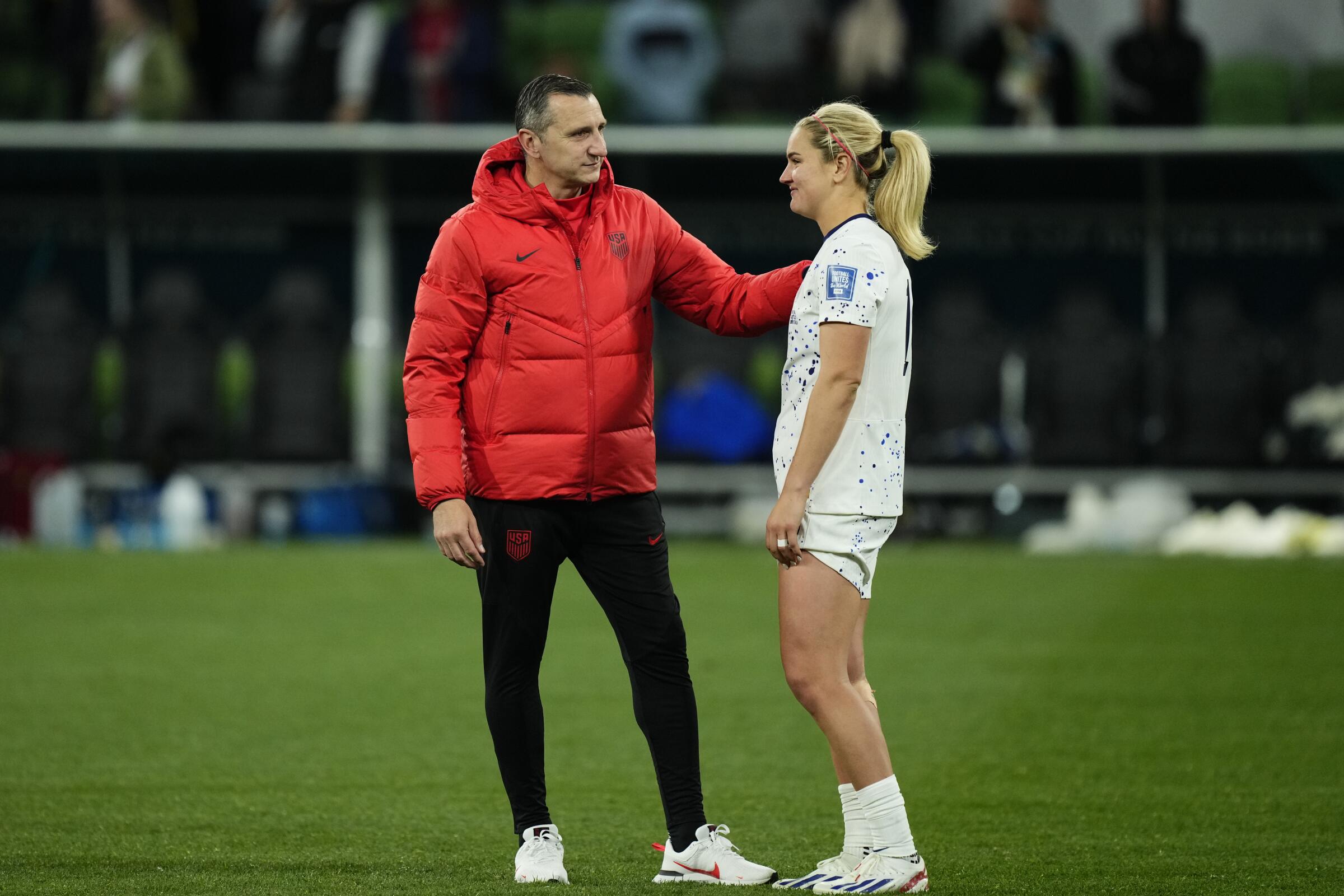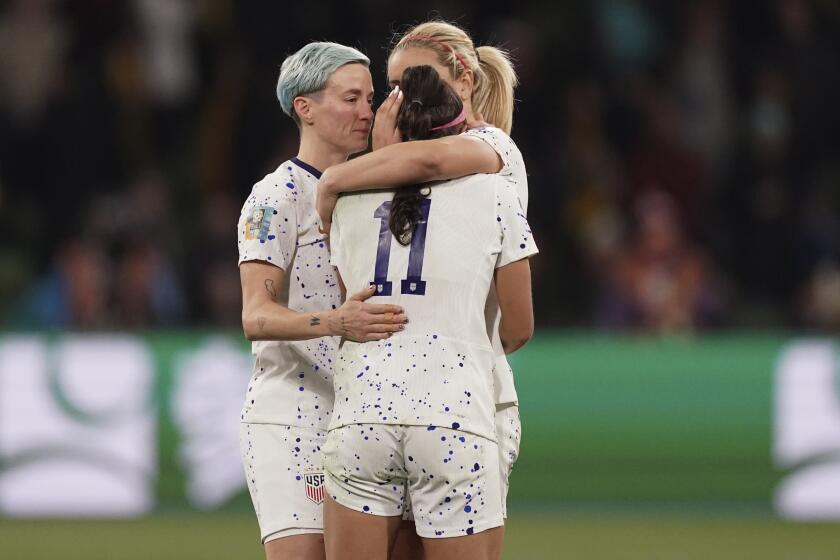Kevin Baxter writes about soccer and hockey for the Los Angeles Times. He has covered seven World Cups, four Olympic Games, six World Series and a Super Bowl and has contributed to three Pulitzer Prize-winning series at The Times and Miami Herald. An essay he wrote in fifth grade was voted best in the class. He has a cool dog.
1
MELBOURNE, Australia — Julie Ertz and Megan Rapinoe tried to smile through tears. Alex Morgan struggled to keep her composure. Sophia Smith didn’t even try at all, instead being whisked past reporters to avoid questions about the earliest Women’s World Cup exit in U.S. Soccer history.
In the immediate aftermath of Sunday’s penalty-kick loss to Sweden in the round of 16, a result determined by an electronic sensor and a video replay, it was hard to find perspective in the pain. What will happen in the future was set aside to mourn in the present.
“I’m just going to take these next few days to process what just happened,” Morgan said.
“It’s tough,” added defender Crystal Dunn. “This was not the way we obviously wanted to go out.”
The U.S. women’s national team was eliminated from the World Cup after Sweden’s final penalty kick narrowly bounced past the goal line.
The U.S. didn’t lose in either Australia or New Zealand. But it didn’t win either, playing to three straight draws before being eliminated on penalty kicks in the round of 16. It remains unbeaten in its last 21 World Cup games, but it won’t play again in the tournament for another four years.
That the end came against Sweden, the American superwomen’s kryptonite, was no surprise. The Swedes beat them in the Tokyo Olympics, eliminated them on penalty kicks in the Rio Olympics and beat them again in the group stage of the 2011 World Cup.
“It’s hard,” said Ertz, who played every minute of her third World Cup “to kind of think about moving on.”
Yet that process has already begun. Players began booking flights home Monday while the federation considered the fate of coach Vlatko Andonovski, whose own departure could be announced later this week.
“As we always do after a major tournament, we will conduct a review to identify areas of improvement and determine our next steps,” U.S. Soccer said in a statement.
It’s unlikely Andonovski survives that review.
Hired in 2019 to replace Jill Ellis, a two-time World Cup champion and the winningest coach in U.S. Soccer history, Andonovski was criticized for his tactics in the Tokyo Olympics, where his team lost twice — matching its total from the first six Olympics combined — to finish third. His approach was equally perplexing in this World Cup, a tournament that seemed much too big for him.

Megan Rapinoe reacts after missing a penalty kick during the United States’ loss to Sweden in the Women’s World Cup on Sunday.
(Hamish Blair / Associated Press)
Andonovski seemed to have little confidence in his bench, making few substitutions. And he had little success fixing an attack that went scoreless in its final 238 minutes.
Asked if she felt the coaching staff had prepared the team to succeed Morgan, who along with Rapinoe, Kelley O’Hara and goalkeeper Alyssa Naeher, has likely played her last World Cup game, declined to answer.
“I mean… I can’t even process that question,” she said.
The coach also sidestepped questions about his future.
“I never came into the job, never came in in the locker room, with a mind-set to do something to save my job,” he said. “I was always focused on doing the job the best in the best possible manner to prepare this team. That was the only thing that was in my focus, and it won’t change. It will never change. No matter what happens in the future, that’s how I approach whether it’s this job or the next job.”
Andonovski’s problems started long before the World Cup did. Injuries to midfielders Catarina Macario and Sam Mewis, captain Becky Sauerbrunn and forward Mallory Swanson, who scored seven goals in six games before tearing the patellar tendon in her left knee in April, left him without four likely starters. In their place he chose a roster with a U.S.-record 14 World Cup debutantes, including 18-year-old Alyssa Thompson, the second-youngest American to play in a World Cup, and 10 other players with 30 or fewer international caps.

As a result, the players seemed to spend much of the tournament getting acquainted. But also as a result, the future seems bright. According to the stats service OptaJack, players 23 and younger accounted for nearly a quarter of the minutes played by the U.S. in this World Cup.
That may have hurt the U.S. in the present, but it will pay off going forward. Part of Andonovski’s job over the last four years was to rejuvenate a team that had grown old under Ellis. In that he has succeeded.
“We have a long future ahead,” forward Lynn Williams said. “There’s a lot of young talent. “I think it’s hard to see right now, but we’ll be back.”
Captain Lindsey Horan agreed.
“Look at some of these players, how they’re playing, these young players coming up and, and doing such big things for this team already at their age,” she said. “So I think the potential of this team moving forward and going into the Olympics next summer, it’s going to be outstanding.”
All they need now is someone to lead them. But that’s a decision that will likely wait until the tears have dried, the present becomes the past and that future comes more clearly into focus.








